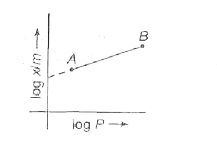In the adsorption of a gas on soild, Freundlich isotherm is obeyed . The slope of the plot is zero. Thus, the extent of adsorption is
directly proprotional to the pressure of gas
inversely proprotional to the pressure of the gas.
independent of the pressure of the gas.
proportional to the square of the pressure of the gas.
The correct Answer is:C
To solve the problem regarding the adsorption of a gas on a solid where the Freundlich isotherm is obeyed and the slope of the plot is zero, we can follow these steps:
1. Understand the Freundlich Isotherm Equation:
The Freundlich isotherm is given by the equation:
XM=KP1n
where:
- X = mass of gas adsorbed
- M = mass of the adsorbent
- P = pressure of the gas
- K and n = constants specific to the system.
2. Take the Logarithm of Both Sides:
To analyze the relationship, we take the logarithm of both sides:
log(XM)=log(K)+1nlog(P)
3. Identify the Linear Form:
The above equation can be compared to the linear equation y=mx+c:
- y=log(XM)
- x=log(P)
- c=log(K)
- m=1n (slope)
4. Analyze the Given Information:
The problem states that the slope of the plot is zero. This means:
1n=0⟹n=∞
5. Interpret the Implication of the Slope Being Zero:
If n approaches infinity, the term 1nlog(P) approaches zero for any finite value of P. This indicates that:
XM is constant regardless of P
Therefore, the extent of adsorption (X/M) does not depend on the pressure of the gas.
6. Conclusion:
Since the extent of adsorption is independent of the pressure of the gas, we conclude that the correct answer is:
- The extent of adsorption is independent of the pressure of gas.
Final Answer:
The extent of adsorption is independent of the pressure of gas.
The Freundlich isotherm is given by the equation:
XM=KP1n
where:
- X = mass of gas adsorbed
- M = mass of the adsorbent
- P = pressure of the gas
- K and n = constants specific to the system.
To analyze the relationship, we take the logarithm of both sides:
log(XM)=log(K)+1nlog(P)
The above equation can be compared to the linear equation y=mx+c:
- y=log(XM)
- x=log(P)
- c=log(K)
- m=1n (slope)
The problem states that the slope of the plot is zero. This means:
1n=0⟹n=∞
If n approaches infinity, the term 1nlog(P) approaches zero for any finite value of P. This indicates that:
XM is constant regardless of P
Therefore, the extent of adsorption (X/M) does not depend on the pressure of the gas.
Since the extent of adsorption is independent of the pressure of the gas, we conclude that the correct answer is:
- The extent of adsorption is independent of the pressure of gas.
The extent of adsorption is independent of the pressure of gas.
Topper's Solved these Questions
- SURFACE CHEMISTRYBOOK - NCERT FINGERTPS ENGLISHCHAPTER - SURFACE CHEMISTRYEXERCISE - HOTS
7 Videos
- SURFACE CHEMISTRYBOOK - NCERT FINGERTPS ENGLISHCHAPTER - SURFACE CHEMISTRYEXERCISE - NCERT EXEMPLAR PROBLEMS
25 Videos
- SOLUTIONS BOOK - NCERT FINGERTPS ENGLISHCHAPTER - SOLUTIONS EXERCISE - Assertion And Reason
15 Videos
- THE D- AND F- BLOCK ELEMENTS BOOK - NCERT FINGERTPS ENGLISHCHAPTER - THE D- AND F- BLOCK ELEMENTS EXERCISE - Assertion And Reason
15 Videos
Similar Questions
In Freundich adsorption isotherm
The slope of the AB line

View SolutionFreundlich adsorption isotherm is
View SolutionThe extent of adsorption of a gas on a solid depends on the :
View SolutionSpontaneous adsorption of a gas on a solid surface is exothermic process because
View SolutionSponetaneous adsorption of a gas on solid surface is an exothermic process because
View SolutionFreundlich isotherm explains the behaviour of
adsorption
View SolutionFreundlich isotherm explains the behaviour of
adsorption
View SolutionHow the adsorption of a gas is related to the critical temperature
View SolutionThe equation for Freundlich adsorption isotherm is
View SolutionIn adsorption from solution phase, the Freundlich adsorption isotherm is modifined as
View Solution
